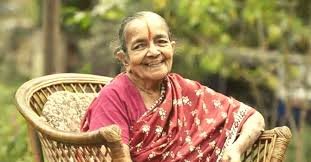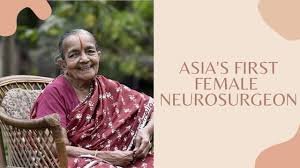India Celebrates its First Female Neurosurgeon: Dr. T.S. Kanaka
Introduction
India’s medical fraternity celebrates a remarkable achievement with the emergence of Dr. T.S. Kanaka as the nation’s first female neurosurgeon. This trailblazing woman broke the glass ceiling in a domain traditionally dominated by men, making significant strides in the field of neurosurgery. Her accomplishments are not just a personal triumph but a milestone in India’s medical history, paving the way for women in healthcare.
Dr. T.S. Kanaka’s Contribution to Neurosurgery
Dr. T.S. Kanaka is celebrated for her contributions to neurosurgery in India. She was not just the first woman neurosurgeon in the country but also one of the earliest women to pursue a career in neurosurgery worldwide. Her dedication to advancing medical technologies and procedures has left a lasting impact. Dr. Kanaka’s commitment to her patients, research, and teaching has made her an iconic figure in Indian medicine.
Pioneering Role in Deep Brain Stimulation
One of Dr. Kanaka’s most remarkable achievements was her pioneering work in the field of deep brain stimulation (DBS). DBS is a treatment for neurological disorders such as Parkinson’s disease, essential tremor, and dystonia. Dr. Kanaka played an instrumental role in developing this technology in India, bringing advanced treatment options to patients who otherwise had limited choices for managing these conditions.
Empowering Women in Medicine
Dr. Kanaka’s journey to become a neurosurgeon in a male-dominated field was not easy. However, she remained determined and resilient, which made her a role model for aspiring female doctors. Her success has inspired generations of women to pursue careers in fields traditionally perceived as male-centric. Dr. Kanaka’s influence continues to resonate within the medical community, where women are now more frequently represented in various specialties, including neurosurgery.
A Legacy of Service and Innovation
In addition to her clinical work, Dr. Kanaka contributed significantly to medical education and research in India. She was an advocate for the use of advanced medical technologies and innovative procedures. Even after her retirement, she continued to serve patients and the medical community by sharing her expertise and knowledge.

Why This News is Important
Inspiring the Next Generation of Women in Medicine
Dr. T.S. Kanaka’s story is a beacon of inspiration for young women aspiring to break barriers in male-dominated professions. Her achievements in neurosurgery, a field known for its complexity and male dominance, serve as a powerful example that women can excel in any domain they choose. Her legacy encourages more women to pursue careers in medical sciences, especially in specialties where female representation is low.
Advancing Medical Science in India
Dr. Kanaka’s contributions to neurosurgery and deep brain stimulation are pivotal moments in the advancement of medical science in India. Her work has brought advanced neurological treatments within reach for Indian patients. The introduction of innovative procedures like DBS highlights the importance of her role in transforming the healthcare landscape in the country.
A Role Model for Perseverance and Excellence
In a world where perseverance and excellence define success, Dr. Kanaka stands out as a shining example. Her journey highlights the importance of grit, determination, and passion for one’s work. These qualities are essential for students preparing for government exams in various fields, including medical, defence, and civil services.
Historical Context
Women in Indian Medicine: A Slow but Steady Rise
Historically, women in India faced societal constraints when entering professional fields, especially in medicine. While there have been women doctors in the country since the 19th century, the path was fraught with challenges. Dr. T.S. Kanaka emerged as a leader in the 20th century, paving the way for women in neurosurgery, a field previously considered beyond reach for female professionals. Her success is part of a broader movement toward gender equality in the medical field, which has seen steady progress over the decades.
Evolution of Neurosurgery in India
Neurosurgery in India has evolved significantly over the years. It began in the 1940s with pioneers like Dr. Jacob Chandy, considered the father of Indian neurosurgery. Dr. Kanaka’s entry into this field in the 1960s marked an important milestone in the history of neurosurgery, especially in terms of female representation. Her work in deep brain stimulation further pushed the boundaries of neurological treatment options in India, bringing it on par with global standards.
Key Takeaways from “India Celebrates its First Female Neurosurgeon”
| S. No. | Key Takeaway |
|---|---|
| 1 | Dr. T.S. Kanaka became the first female neurosurgeon in India, breaking barriers in a male-dominated field. |
| 2 | She was a pioneer in deep brain stimulation (DBS), a treatment for neurological disorders like Parkinson’s. |
| 3 | Dr. Kanaka’s journey has inspired generations of women to pursue careers in fields such as neurosurgery. |
| 4 | Her contributions helped bring advanced medical technologies and procedures to India. |
| 5 | Dr. Kanaka’s legacy in medical education and research continues to influence modern neurosurgery in India. |
Important FAQs for Students from this News
Who is Dr. T.S. Kanaka?
- Dr. T.S. Kanaka is the first female neurosurgeon in India, known for her pioneering work in neurosurgery and deep brain stimulation.
What is deep brain stimulation (DBS)?
- DBS is a medical treatment involving the implantation of a device that sends electrical impulses to specific brain areas to help alleviate symptoms of neurological disorders such as Parkinson’s disease.
What impact has Dr. Kanaka had on women in medicine?
- Dr. Kanaka’s achievements have inspired many women to pursue careers in medicine, especially in fields that are traditionally male-dominated, such as neurosurgery.
How has neurosurgery evolved in India?
- Neurosurgery in India has seen significant growth since the mid-20th century, with advances in technology and increased representation of women in the field.
Why is Dr. Kanaka considered a role model?
- Dr. Kanaka is a role model for her perseverance and dedication, proving that women can excel in any field, including complex specialties like neurosurgery.
Some Important Current Affairs Links















